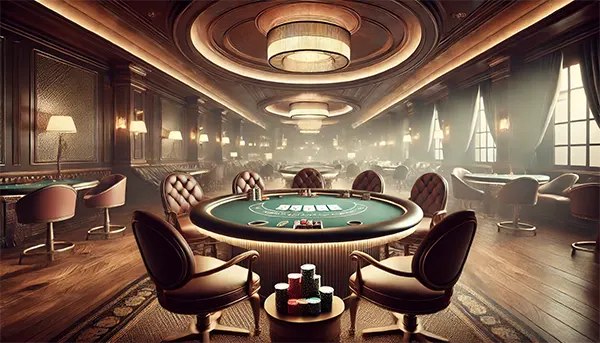
Poker Psychology: How to Stay Calm Under Pressure
In the high-pressure world of poker, a player’s mental state can significantly influence the outcome of the game. While technical skills are crucial, understanding the psychology behind poker can provide an edge in decision-making and emotional control. This article explores the psychological aspects of poker, focusing on how to maintain composure, handle stress, and develop emotional resilience to improve your overall game. Whether you’re a beginner or an experienced player, mastering the mental game is essential for success.
Understanding the Psychological Challenges of Poker
Poker is more than just a game of cards. It’s a psychological battle where players must constantly read their opponents, manage their emotions, and stay focused. One of the most significant psychological challenges in poker is the uncertainty that comes with every hand. No matter how skilled you are, there will always be a level of unpredictability. This uncertainty can lead to stress and anxiety, especially when the stakes are high. In addition, players must learn how to control their emotional responses to wins, losses, and surprises. Emotional swings can cloud judgment, making it difficult to make rational decisions.
Another challenge players face is the mental fatigue that comes with long poker sessions. Poker requires intense focus and concentration, which can drain a player’s mental energy. The longer a session goes on, the more susceptible players are to emotional lapses or poor decision-making. This is why maintaining mental discipline throughout the entire session is essential. Players who can stay focused and emotionally balanced for extended periods have a distinct advantage over those who lose their composure.
Furthermore, poker players must cope with the pressure of bluffing and trying to deceive their opponents. Bluffing is a critical aspect of the game, but it’s a psychological strategy that can backfire if not executed properly. The pressure to bluff successfully, without revealing any signs of weakness, can create immense stress. Knowing when and how to bluff is not only a skill but also a mental challenge that requires confidence and control. To succeed, players need to have a strong psychological foundation to handle these high-pressure moments without letting their emotions take over.
Identifying Emotional Triggers
Emotions play a huge role in poker, and identifying emotional triggers is the first step in controlling them. A common emotional trigger is the fear of losing. When players are afraid of losing, they may make rash decisions in an attempt to recover their losses. This “chasing losses” mentality is a dangerous trap that can lead to even greater losses. Understanding that losing is part of the game and accepting it as such can help players stay calm and avoid making impulsive decisions.
Another emotional trigger is overconfidence, often seen after a few successful hands. While confidence is important, overconfidence can lead to recklessness. Players may begin to believe that they can win every hand, which can cloud their judgment. This is particularly dangerous in poker, where each hand is different, and the outcome can never be guaranteed. Recognizing when confidence turns into overconfidence is essential for maintaining control over one’s emotions and ensuring that decisions are made based on logic, not ego.
Frustration and anger are also common emotional triggers in poker. When things don’t go a player’s way, they may become frustrated and start making emotional decisions rather than strategic ones. This emotional shift can lead to poor betting choices or erratic behavior that is easy for opponents to pick up on. Learning to recognize these emotional states and manage them effectively is crucial for maintaining composure and focus during a game.
Techniques for Staying Calm During High-Stress Situations
High-stress situations are inevitable in poker, especially in tournaments or when playing for large stakes. Players who can remain calm under pressure often have an advantage, as stress can cloud decision-making abilities. One of the best ways to stay calm is to practice deep breathing exercises. Deep breathing helps reduce anxiety and helps players refocus on the game. By taking slow, deep breaths, players can calm their nerves and reset their mental state, allowing them to think more clearly and make better decisions.
Mindfulness is another useful technique for maintaining composure. Mindfulness involves staying fully present in the moment, focusing on what’s happening right now rather than worrying about future hands or past mistakes. This mental technique helps players avoid becoming overwhelmed by the game’s emotional ups and downs. By practicing mindfulness, players can stay focused on their strategy and make logical decisions without being influenced by emotions.
Visualization is a technique used by many successful poker players. Visualization involves mentally rehearsing poker hands before they happen, imagining different scenarios, and how to react to them. This technique helps players stay calm by giving them a mental framework to deal with any situation that arises at the table. Visualization can also help players anticipate their opponents’ moves, allowing them to respond strategically rather than react impulsively.
Breathing Exercises and Mindfulness
Breathing exercises are one of the simplest yet most powerful tools for managing stress. By focusing on deep, rhythmic breathing, players can lower their heart rate and reduce anxiety. This technique helps counteract the physical symptoms of stress, such as rapid heartbeat or shallow breathing, which can interfere with a player’s ability to think clearly. Breathing exercises are easy to practice and can be done discreetly at the table, making them an ideal tool for poker players.
Mindfulness, on the other hand, involves focusing on the present moment and letting go of any thoughts that might distract you. When playing poker, this means focusing on the cards in your hand, the board, and the players around you without thinking about past mistakes or future outcomes. Mindfulness helps players avoid getting caught up in negative emotions and instead directs their attention to making the best possible decisions based on the current situation.
Together, these techniques can significantly improve a player’s ability to stay calm and focused. By practicing breathing exercises and mindfulness, players can reduce the impact of stress and improve their overall performance in the game. These methods are not only helpful for poker but can be applied to many other areas of life where stress and pressure are present.

Developing Emotional Discipline for Long-Term Success
Emotional discipline is one of the most important qualities a poker player can develop. It involves managing your emotions and reactions consistently over the long term. One key aspect of emotional discipline is patience. Poker is a game that requires waiting for the right opportunities, and players must be willing to fold mediocre hands and wait for stronger ones. Impatience can lead to poor decisions and unnecessary risks, which is why emotional discipline is crucial for maintaining a winning strategy.
Another aspect of emotional discipline is controlling your ego. It’s easy to become attached to your self-image as a skilled player, but poker is a game of constant learning and adaptation. Players who let their ego drive their decisions may overestimate their abilities and take unnecessary risks. Keeping the ego in check and acknowledging that there is always more to learn can help players make better decisions and avoid costly mistakes.
Lastly, emotional discipline means knowing when to step away from the table. Whether you’re on a losing streak or simply feeling fatigued, knowing when to take a break is essential for long-term success. Continuing to play while emotionally drained or frustrated can lead to poor decision-making. Players who can recognize when it’s time to walk away from the game are more likely to make better choices and return refreshed for the next session.
Building Resilience Through Practice
Emotional discipline, like any other skill, improves with practice. By regularly exposing yourself to high-pressure situations, you can build mental resilience. The more you practice managing stress and controlling emotions, the more natural it will become. Players who consistently practice emotional discipline can handle the ups and downs of poker with ease, making rational decisions even in the most intense moments.
It’s also important to reflect on your emotional state after each game. Analyzing how you felt during different moments in the game can help you identify areas where you need to improve. For example, if you noticed that you became anxious after losing a big hand, you can work on developing strategies to manage that anxiety in future games. Self-reflection is key to building resilience and becoming a more emotionally disciplined player.
Lastly, it’s crucial to remember that emotional discipline is a lifelong process. No one becomes a master of emotional control overnight. But with consistent practice and a commitment to learning from your experiences, you can gradually build resilience and improve your emotional discipline. Over time, these skills will become second nature, giving you a significant advantage over your opponents in the mental game of poker.

